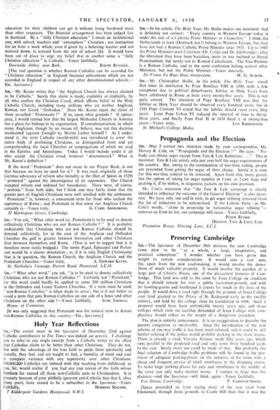SIR,—Mr. Keene writes that " the Anglican Church has always
claimed to be Catholic." Surely this claim is made, explicitly or implicitly, by all who confess the Christian Creed, which affirms belief in the Holy Catholic Church,. including many millions who are neither Anglican, Roman, nor Greek " Orthodox." Does Mr. Keene reject the claim of these so-called Protestants ?" if so, upon what grounds ? If episco- pacy, I would remind him that the largest Methodist Church in America has a place for bishops in its organisation. If consubstantiation, in which many Anglicans, though by no means all, believe, was not this doctrine maintained (against Zwingli) by Martin Luther himself ? As I under- stand it, the term Catholic (world-wide) was introduced to cover the entire body of professing Christians, as distinguished from and yet comprehending the local Churches or congregations of which we read in the Epistles and Apocalypse. Today 1 would include under it all who accept the Christian creed, however "denominated." What is Mr. Keene's definition?
If the word "Protestant " does not occur in our Prayer Book, is not that because we have no need for it ? It was used originally of those German advocates of reform who (notably at the Diet of Spires in 1529) " protested " against the intransigence of its opponents. Our Church accepted reform and widened her boundaries. There were, of course, " protests" from both sides, but I think one may fairly claim that the greater part of English Christians were well satisfied with the settlement. "Protestant" is, however, a convenient term for those who eschew the supremacy of Rome ; and Protestant in that sense our Anglican Church certainly is.—Yours truly, G. CYRIL ARMSTRONG. 32 Hartington Grove, Cambridge.






































 Previous page
Previous page